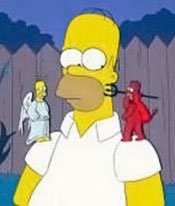VagrantFarce
Active member
- Joined
- Nov 19, 2008
- Messages
- 1,558
I'm stealing most of this from Lenore Thompson, but does this seem accurate to any of you? I think it does seem accurate, but I'd like to hear how this behaviour reflects itself in other types. 
Dominant: The lens through which we see the world. We instinctively assume that everyone shares this lens and are confused and frustrated when we meet people who refuse to gel with this worldview (e.g. an INTP can become incredibly frustrated with someone who doesn't think logically and holistically), what we use to convince ourselves that the inferior function isn't to be relied upon. We tend not to be too aware of this function unless made aware of it, either through introspection or external stimuli.
Auxillary: What we primarily identify with, the part of us that we tend to describe ourselves as (e.g. an INTP would describe himself as a creative thinker), what we tend to preach as a life philosophy (e.g. an INTP would preach that thinking creatively, or being open to new experiences, is the key to dealing with life).
Tertiary: The reasons we fall back on for not relying on our auxillary (e.g. an INTP would refuse to enter into an unusual experience because they don't know what would happen), a way of defending ourselves when we fail.
Inferior: Our all-or-nothing "alien hand", the most easily discarded, the one that we most criticize others for while hypocritically not living up to it (e.g. an INTP would say that people tend not to take into consideration other people's contributions or feelings, but when that INTP gets into a stressful situation they will easily discard what other people think).
Dominant: The lens through which we see the world. We instinctively assume that everyone shares this lens and are confused and frustrated when we meet people who refuse to gel with this worldview (e.g. an INTP can become incredibly frustrated with someone who doesn't think logically and holistically), what we use to convince ourselves that the inferior function isn't to be relied upon. We tend not to be too aware of this function unless made aware of it, either through introspection or external stimuli.
Auxillary: What we primarily identify with, the part of us that we tend to describe ourselves as (e.g. an INTP would describe himself as a creative thinker), what we tend to preach as a life philosophy (e.g. an INTP would preach that thinking creatively, or being open to new experiences, is the key to dealing with life).
Tertiary: The reasons we fall back on for not relying on our auxillary (e.g. an INTP would refuse to enter into an unusual experience because they don't know what would happen), a way of defending ourselves when we fail.
Inferior: Our all-or-nothing "alien hand", the most easily discarded, the one that we most criticize others for while hypocritically not living up to it (e.g. an INTP would say that people tend not to take into consideration other people's contributions or feelings, but when that INTP gets into a stressful situation they will easily discard what other people think).

